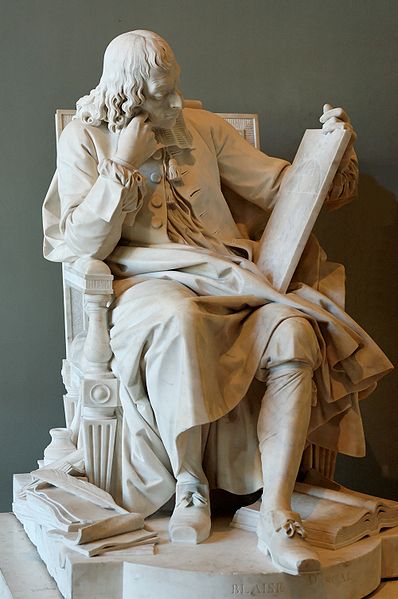 European Rationalism * "Our Pub" Library
European Rationalism * "Our Pub" Library Civilization as emergent from dynamic complexity by Witold Marciszewski |
|
Blaise Pascal in a thoughtful posture, as visualized by the sculptor, belongs to the pantheon of modern science founders: the first constructor of mechanical calculator, an eminent pioneer of probablity and game-theoretical appraoch to decision-making, the discoverer of athmospheric pressure, and so on. Less conspicuous for Pascal scholars is his sharp feeling for the issues of complexity of mathematics, nature, mind, and society, as if precursory with respect to the modern theory of complexity. This is why a picture of him is suitable to symbolize the interest in complexity issues. To wit, the belief in the infinite complexity both of nature and of mathematics.
The complexity of social life, that is, the realm of civilization, was deemed by him as so enormous that he invented a special term for clever mind's ability to deal with such an overwhelming mass of data, namely esprit de finesse. To render this phrase in English literally is no easy task, but the term intuitive mind, as found in some translations, seems to be a reasonable approximation. The concept of intuitive mind has a considerable potential to account for human skills in handling social complexity. This is why so heavily I draw on Pascal's reflections. However, this does not mean that he was close to our modern understanding of how complexity comes into play. Pascal like all the people of his time had no inkling about the titanic work made by the evolution of matter, life, mind, civilization. Only nowadays we are lucky to have learned that in some phases the evolutionary process happened to be crowned by a miraculous event called emergence, to wit, the emergence of life continued in the appearance of conscious mind and civilized society. To enter this central issue, we need an insight into the nature of complex systems. The phrase "complex system" may be disapproved for being an idle talk (almost as redundant as in speaking of red redness). In a frequent use "system" means an object composed of parts, and thus - by virtue of meaning alone - bound to be complex. However, this argument is too simple to match the intricacy of the realm of systems. This realm is so involved that with our scarce and rough vocabulary, with its ambiguities, we cannot hope to describe this realm in an adequate way. This is why the same term has to take different senses depending on the context and the intent of the author. Some senses happen to be amazing (say, in some physics contexts elementary particles, hence devoid of any parts, are called systems in such and such space); but even when disregading extremes, a lot should be done to make our discourse duly consistent. At the start let me explain the following. When adding "complex" to a noun denoting a thing complex by its nature, one hints at a very high degree of complexity: one that is unusual in other kinds of systems, and may produce an phenomenon of emergence. This adjective applies to the domain of systems called dynamic, some of them being specified as complex, while others do not deserve this distinction. Dynamic systems are those which, roughly speaking, change in time. These changes may be continuous or not, linear or not, and so we distinguish varieties of dynamical systems. Before we come to discuss complex systems, it is in order to briefly say about the difference between dynamic and static ones. The simplest example: the computer on my desk, when switched off is a static system, and while executing a program it becomes dynamic, as changing in time. Most instructive cases of static systems belong to the abstract realm of mathematics; they are so nicely transparant in their structure that are able to produce insights into critical features of complexity. Owing to these insights we can observe an important affinity between complexity and information. For this purpose we have to make a small trip to mathematical logic -- the discipline whose task is to account for the language and methods of mathematics. Each mathematical theory has its own domain (universe) of discourse. We call it relational system It contains (1) the set of entities over which certain variables may range, let us call it BS, for Basic Set; (2) properties and relations to hold for elements of this set; (3) operations (functions) performable on these elements. Let us compare two theories with respect t their complexity as well as information amount contained in each of them. Let them be: (A) Arithmetic of natural numbers, (B) Boolean algebra. [To be continued] |
